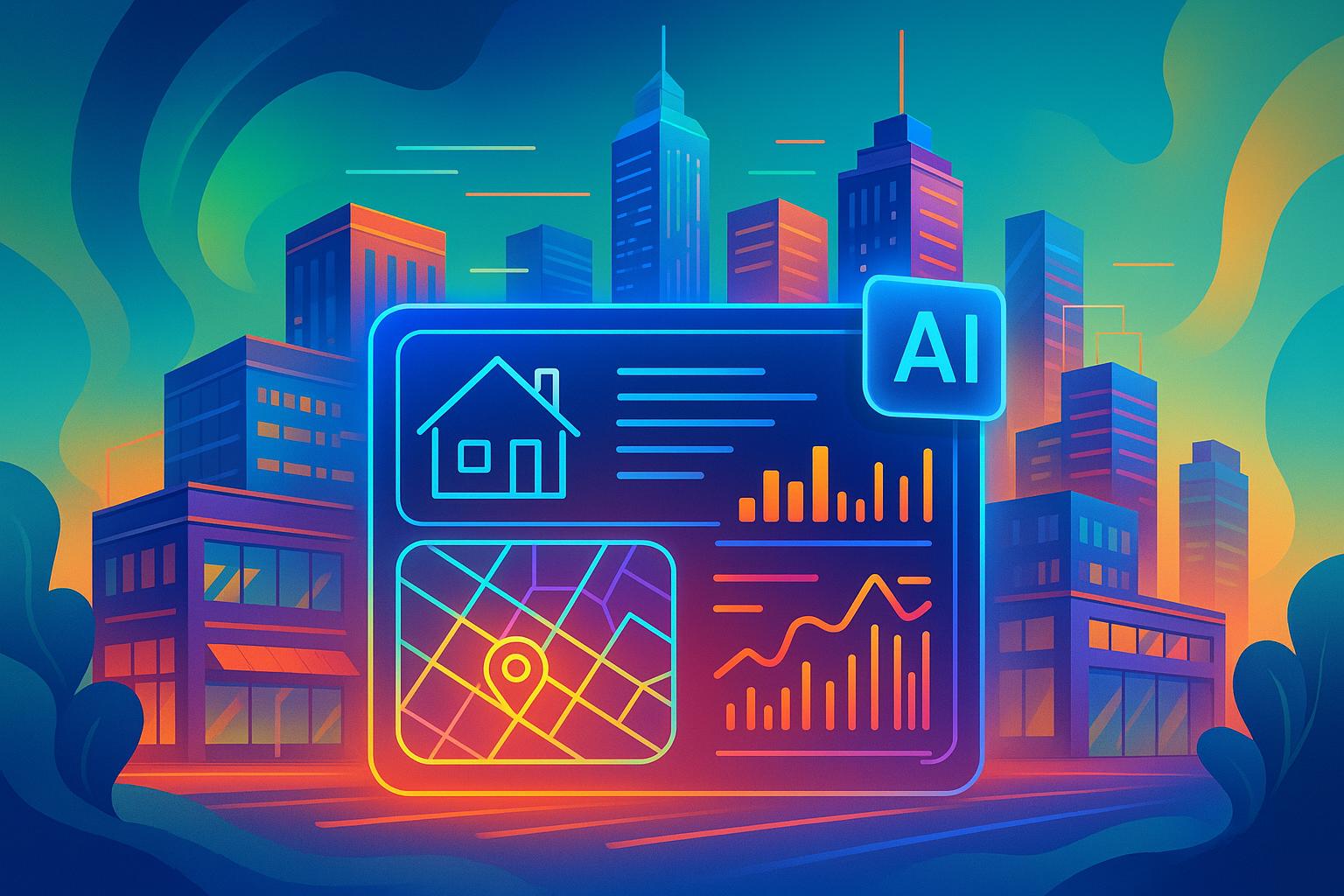AI chatbots are revolutionizing real estate. Here's how they're helping agents and firms boost efficiency and client satisfaction:
- 24/7 Customer Support: Always-on assistance for property inquiries
- Better Lead Collection: Automated gathering and sorting of potential client info
- Lower Operating Costs: Cut customer service expenses by up to 30%
- Custom Responses: Personalized property recommendations based on client preferences
- Automatic Follow-ups: Keep leads warm without manual effort
Key Stats:
- 80% of people approve of AI customer support
- 43% of home hunters start their search online, often outside business hours
- AI in real estate could hit $1,355.89 billion by 2029, growing 35% yearly
- Some firms see 20-40% increases in lead capture and conversion rates with chatbots
Bottom line: Real estate chatbots aren't just nice-to-have – they're becoming essential. They handle routine tasks, freeing up agents to focus on closing deals and building relationships.
Related video from YouTube
1. 24/7 Customer Support
AI chatbots are changing the game in real estate. They're always on, ready to help clients at any time. This is huge in an industry where timing can make or break a deal.
Never Miss a Lead
Picture this: It's 2 AM, and someone's browsing homes online. Instead of waiting until morning, they can chat with a bot right away. They get instant answers about properties, prices, and availability. This matters because 43% of home hunters start their search online, often when real estate offices are closed.
Juggling Multiple Clients
Chatbots are great multitaskers. They can talk to lots of people at once, giving each one personalized attention. This cuts down on wait times and keeps clients happy. As Yellow.ai puts it, "Imagine a service that never sleeps – that's what chatbots offer."
Freeing Up Agents' Time
By handling routine stuff, chatbots let agents focus on what really matters. They can:
- Answer common questions
- Set up property viewings
- Give updates on deals
- Help with paperwork
This means agents can spend more time on high-value work, boosting their productivity.
Real Success Stories
During COVID-19, Hotelbeds teamed up with Landbot to use chatbots on WhatsApp and Facebook Messenger. This helped them handle a flood of customer requests while keeping people happy. In Argentina, Kayros used WhatsApp chatbots to tackle their support team's backlog.
The Future is Now
AI chatbots in real estate are taking off. A report by MMR says AI in real estate could hit $1,355.89 billion by 2029, growing 35% each year. Why? Because people need support 24/7, especially across different time zones.
Keeping Clients Happy
Quick responses are key. About 43% of customer experience pros say people want answers ASAP. In real estate, where big money is involved, fast info can make all the difference in closing deals and keeping clients smiling.
2. Better Lead Collection
Chatbots are changing the game for real estate lead collection. They're making it a breeze for agents to zero in on the best prospects. These AI helpers are pros at gathering and organizing potential client info, making the whole process smoother.
Always On Duty
Chatbots don't clock out. They're there 24/7, making sure no potential lead slips away. When someone visits your site - day or night - the chatbot jumps in. It asks the important stuff: what kind of property they want, how much they can spend, and when they're looking to buy. This matters because lots of people browse listings when most agents are off the clock.
Sorting the Wheat from the Chaff
Chatbots take care of the first steps in figuring out if a lead is worth pursuing. This saves agents a ton of time. The bot asks targeted questions to see if someone's ready to buy. It might start with "Are you looking to buy, rent, or sell?" Then it digs deeper into areas they like and what they can afford.
Smart Data Use
Chatbots do more than just collect info - they make sense of it. They team up with CRM systems to create detailed profiles of leads. This lets agents follow up in a way that feels personal and run marketing that hits the mark.
Ylopo did a study that showed something cool: AI can look at thousands of data points in seconds to figure out how good a lead is. This quick check helps agents focus on the leads most likely to turn into sales.
Making People Happy
Chatbots give quick, personalized answers. This instant help keeps people interested and more willing to share their contact info. Get this: 83% of visitors want help right away when they reach out. That's why chatbots are such a big deal in modern lead generation.
Tips for Realtors
1. Put a chatbot on your whole website. Make it ask the key questions about where people want to live, how much they can spend, and what kind of property they're after.
2. Hook your chatbot up to your CRM. This makes managing leads and following up way easier.
3. Set up your chatbot's conversation flow to ask detailed questions. This way, you'll always get the info you need.
4. Give people a reason to share their info. Offer something valuable like exclusive listings or insider market info.
sbb-itb-11d231f
3. Lower Operating Costs
Chatbots aren't just convenient - they're a smart financial move for real estate businesses. These AI assistants handle basic customer service tasks, helping companies cut costs big time.
Here's the deal:
Chatbots work 24/7, never take breaks, and handle multiple inquiries at once. It's like having a super-employee who never sleeps. Yellow.ai puts it simply: "Implementing a chatbot is a smart financial decision." Why? One chatbot can do the work of several human agents, slashing labor costs.
The numbers don't lie. Many businesses have seen customer service costs drop by up to 30% after bringing in chatbots. That's a big deal, especially for real estate firms watching their bottom line.
LiveHelpNow, a customer service platform, saw a 30% cost reduction after adding AI chatbots. It's not just about saving money - it's about putting resources where they matter most.
Take ModCloth, for example. When they started using live chat support (the grandpa of today's AI chatbots), their average response time dropped by 30% and customer satisfaction jumped 10%. Imagine what today's AI chatbots could do!
Chatbots do more than answer simple questions. They schedule appointments, send property details, and even help with tricky stuff like property valuation and document checks. This frees up real estate pros to focus on the important stuff that needs a human touch.
Now, setting up a chatbot isn't cheap. A basic system might cost $5,000 to $10,000, while fancy AI-powered options can run $20,000 to $80,000. But look at the long-term savings: a $348-per-year chatbot can handle the same simple questions that would cost $12,240 annually if a human did it.
Want to get started? Here's what to do:
- Start small: Test the waters with a basic chatbot to see how it performs.
- Use pre-built platforms: Save time and cash by using existing solutions instead of building from scratch.
- Consider subscription models: Spread out the costs over time.
- Integrate wisely: Connect your chatbot with your existing software for a smooth workflow.
Chatbots aren't just a cool tech toy - they're a smart business move that can save you serious cash in the long run.
4. Custom Responses for Each Client
AI-powered real estate chatbots are changing the game. They're not just answering questions - they're creating personalized experiences that feel almost human.
These smart assistants tailor their responses to each client's unique needs. How? By asking the right questions and learning from every interaction.
Here's what makes these chatbots so effective:
- They ask targeted questions about what you want in a property
- They create a detailed profile based on your answers
- They use this info to recommend properties that match your exact criteria
Let's say you're looking for a two-bedroom flat with a sea view in a specific neighborhood. The chatbot will quickly filter and show you properties that fit the bill. No more wading through irrelevant listings!
But here's the cool part: these chatbots get smarter over time. They use AI to analyze past conversations and improve their responses. The more people use them, the better they get.
Real estate companies using these advanced chatbots are seeing big results. Some report 20% to 40% increases in lead capture and conversion rates. That's huge!
These chatbots don't just answer questions - they guide you through the entire property search process:
- Ask about your preferences
- Show you a curated list of properties
- Help you schedule viewings
It's a smooth, seamless experience that makes you more likely to find (and buy or rent) your dream property.
Big names in real estate are jumping on board:
Century 21 introduced "Sofia", a virtual assistant for property searches and appointment scheduling.
Compass launched "Compass Concierge" for 24/7 support and property tour scheduling.
As AI keeps advancing, expect even smarter chatbots in the future. They'll get even better at understanding what you want and finding the perfect property match.
For real estate pros, this means serving more clients without hiring more staff. Agents can focus on high-value tasks while chatbots handle initial inquiries and info gathering.
In an industry where personal touch matters, AI chatbots are proving that tech can enhance, not replace, human customer service. They're setting a new standard for personalized real estate experiences - one custom response at a time.
5. Automatic Client Follow-ups
Chatbots are changing the game in real estate lead nurturing. These AI assistants work 24/7, making sure no potential buyer or seller falls off your radar.
Here's the deal: Chatbots keep your leads warm without you lifting a finger. They send personalized messages that keep prospects engaged throughout their property search. This constant communication can turn a casual browser into a serious buyer.
Let's look at ManyChat. This platform lets real estate pros send targeted updates to chatbot subscribers. It's not just about staying in touch – it's about staying relevant.
But wait, there's more. These AI helpers are getting smarter. They can:
- Book property viewings right in the chat
- Answer FAQs anytime
- Give neighborhood insights to speed up deals
Take RAIya, for example. This chatbot qualifies buyers and sellers automatically, schedules showings, and even shares local tips. It frees up agents to do what they do best: close deals.
The results? Many real estate firms see lead capture and conversion rates jump by 20% to 40% after using advanced chatbots.
Here's a tip: Make sure your chatbot plays nice with your CRM. This way, every chat, every bit of data, feeds into your bigger marketing plan. It's all about creating a system where no lead slips through the cracks.
Remember: Chatbots aren't here to replace you. They're here to help. A good chatbot warms up leads, answers basic questions, and then hands off to a live agent when it's time. It's about finding that sweet spot between efficiency and the personal touch that real estate needs.
In real estate, timing is key. Automatic follow-ups through chatbots mean you're always there when a client needs you – even when you're not. It's not just handy; it's becoming a must-have in today's real estate world.
Conclusion
Chatbots are changing the real estate game. They're not just a fancy add-on anymore - they're becoming a must-have for anyone who wants to keep up in the property world.
Let's look at Sterling Estates. They added an AI chatbot to their WhatsApp and Facebook:
- They now respond to leads in minutes, not hours
- 45% more property viewings turn into sales
- Their sales team's workload dropped by 60%
LeeWen from Sterling Estates says: "This AI chatbot? It's been huge for us. We're handling leads better and selling more."
And it's not just Sterling Estates. The whole industry is jumping on board:
- 72% of real estate bigwigs are putting money into AI
- 85% plan to spend more on chatbots
- 92% think chatbots give them an edge over competitors
What's next for these chatbots? As AI gets smarter, we might see:
- Virtual property tours
- Better market analysis
- Smoother connections with other business tools
The takeaway? If you're in real estate, you need to get on the chatbot train. They handle the small stuff so you can focus on the big picture: building relationships and closing deals.
As we head into 2024, AI will keep shaping how we buy and sell property. The pros who use these tools will be the ones who come out on top.


